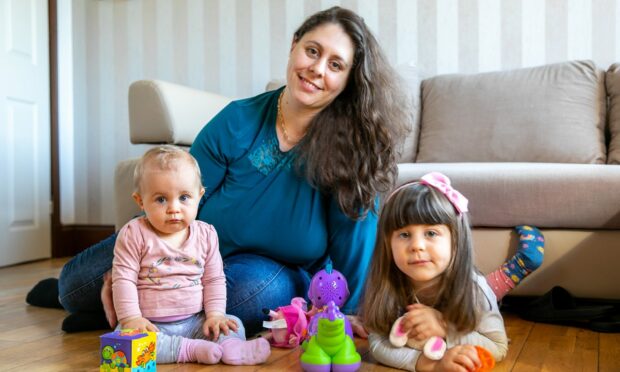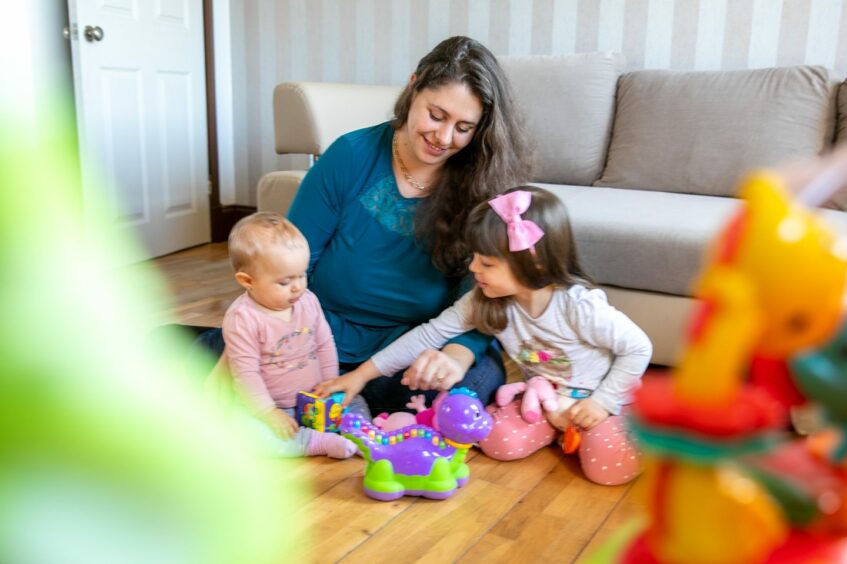Working parents across the country pay eye-watering sums of money every month in childcare fees.
The costs are so high that many parents are left with just a small fraction of their wages after paying the bill and others decide it is not worth their while to work.
The working parent trap ‘has’ to change, say many parents. We spoke to three Dundee families about how nursery fees impact on their lives:
- Mum of two, Haristina Georgieva, a degree qualified HR specialist will soon be spending 80% of her wages on childcare while spending a further 10% on petrol to get to work.
- Teacher Gary Phillips, who says the £1,000 he pays every month for his two sons’ nursery fees impacts on their quality of life.
- Sarah Laing, a mum of one, who is saving for a house and needs income from employment to apply for a mortgage.
‘I don’t go to work to earn a living’
Both originally from Bulgaria, Haristina Georgieva and her husband have lived in Dundee for nine years, during which time Haristina completed a degree in human resource management at Abertay University.
She works part-time in Perth, and when her second daughter starts nursery in July, she will be spending 80% of her wages on childcare fees plus a further 10% on petrol to get to work.
She said: “To be honest, I don’t go to work to earn a living, I go to help develop my career. If I didn’t have my husband that would be not at all possible.
“Something needs to be done for people who want to work. So many people decide not to work because it all goes out on childcare, it doesn’t make sense.
“But for me, I know that if I have a gap in my career, that rings alarm bells for employers.”
Haristina says she is also keen for her two daughters, Valentina and Anna, to attend nursery to improve their social development and English language skills.
She added: “Even if I wasn’t working I would want them to go to nursery. I just don’t think there are enough activities to do for free and even the ones you pay for only last an hour.”
‘It makes a difference to what we can offer our children’
Dundee couple Gary Phillips and Anna McFarlane pay nursery fees for two children, Owen and Rory.
Gary says the £1,000 monthly bill is manageable for them, but he does often consider the difference it could make to their lives if they did not have it.
The primary school teacher said: “It makes a difference to what we can offer our children, it’s a big knock off our disposable income.
“That could be the cost of getting work done to the house, or our first family holiday.
“Post-pandemic there are so few things for us to do as parents that don’t cost – we’ve lost Olympia, there are no other toddler friendly pools around here.
“The advantage of nursery is that they form social connections, experience new things, sensory play, peer engagement, and all the benefits that go along with that.”
Gary says through his work he sees schools doing their best to make experiences affordable for all parents and thinks something similar needs to be adopted nationwide to make nursery more accessible for everyone.
‘I need the income to apply for a mortgage’
Sarah Laing and partner Neil Cowie’s son, Lucas, usually attends nursery three days a week, at a cost of £400-500 per month.
The cost of childcare fees have such an impact on Sarah’s family budget that her parents contribute towards the bill.
Sarah, from Dundee, said: “We both pay towards it, but without their contribution he wouldn’t be going as much as he is – the money would be too much.
It’s a huge amount of money”
Sarah Laing
“It’s a huge amount of money, by the time we’ve paid it, there isn’t much left.
“But we want him to go to nursery for his own development. He doesn’t have the same social interactions with other children at home, so we pay it, for his own good.
“We’re also trying to move house. We’re currently in a flat and trying to get a house with a garden to get a better setting for him, so I need the income to apply for a mortgage.”
Funding available
In Scotland, children aged three to five, and some two-year-olds, are entitled to 1,140 hours of early learning and childcare.
Children can access their entitlement at local authority nurseries, private nurseries working in partnership with councils and some childminders.
How access works can vary between different types of ELC providers and local authorities.













Conversation